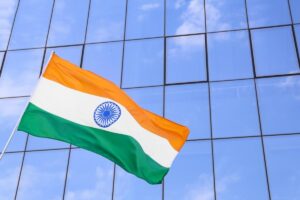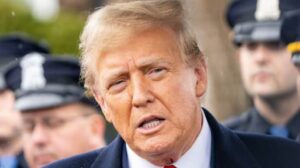
Indian Prime Minister Narendra Modi said that he remains a consistent supporter of peace, and “where we can act as peacemakers, we are happy to take on this responsibility.”
“Because India is the land of Gautam Buddha and Mahatma Gandhi. And Indians are not prone to enmity and conflict. Instead, we support harmony… We stand for peace. And wherever we can act as peacemakers, we are happy to take on that responsibility,” Modi said in an interview for Lex Friedman’s podcast, published on Sunday.
According to the prime minister, he has good relations with both Ukraine and Russia.
“I have close relations with both Russia and Ukraine. I can sit with President Putin and say that now is not the time for war. And I can also say to President Zelensky in a friendly way that, brother, no matter how many people stand with you in the world, there will never be a solution on the battlefield. The solution will come only when both Ukraine and Russia sit down at the negotiating table,” the Indian Prime Minister said.
“It was difficult to find peace at first, but the current situation provides an opportunity for meaningful and productive talks between Ukraine and Russia,” Modi emphasized.
According to him, the war has brought “a lot of suffering, even the Global South has suffered”. “The world is struggling with the crisis of food, fuel and fertilizers. So, the international community must unite in the pursuit of peace. As for me, I have always maintained that I am on the side of peace. I am not neutral. I have a position, and it is peace. And peace is what I am striving for,” Modi summarized.

President of the United States Donald Trump has promised that on Monday, March 17, there will be news about the ceasefire talks with Ukraine and Russia. He said this in an interview with journalist Sheryl Attkisson, answering a question about his communication with Putin.
“We are dealing with him, and I think it’s a reasonable thing to do. The situation is very complicated, you know, it’s a bloody, terrible war. I think everything is going well. You know, we have a ceasefire agreement with the Ukrainians. And we are trying to get it with Russia. And I think that so far it’s gone well. We’ll know a little bit more on Monday. And I hope it goes well,” Trump said.

The United States and Russia have agreed on four principles after talks that lasted more than four hours in Saudi Arabia, US Secretary of State Marco Rubio said on Tuesday, CNN reported. The senior official listed them.
“Restore the functionality of our respective missions in Washington and Moscow. In order for us to continue down this path, we have to have diplomatic institutions that are open and functioning properly,” he said.
“We’re going to appoint a high-level team from our side to help negotiate and work to end the conflict in Ukraine in a way that is lasting and acceptable to all parties involved,” Rubio said.
“To begin discussing, contemplating and exploring both geopolitical and economic cooperation that could result from an end to the conflict in Ukraine,” the Secretary of State added.
“The five of us who were here today… will continue to be engaged in this process to make sure it moves forward in a productive way,” the State Department head summarized.
The five people Rubio mentioned were himself, National Security Advisor Mike Waltz, Special Envoy Steve Vitkoff, as well as Russian Foreign Minister Sergey Lavrov and presidential aide Yuri Ushakov.
“President Trump wants to stop the killing; the United States wants peace and is using its power in the world to bring countries together. President Trump is the only leader in the world who can convince Ukraine and Russia to agree to this,” Rubio added.
The secretary of state also said that “one phone call followed by one meeting is not enough to establish a lasting peace. We must act, and today we took an important step forward.”
Rubio expressed his gratitude to the Kingdom of Saudi Arabia for hosting him under the leadership of Crown Prince Mohammed bin Salman Al Saud.
As reported, on Tuesday, the first round of talks between US and Russian officials took place in Riyadh (Saudi Arabia), which lasted more than four hours. As previously reported by the media, the main topic of the talks should be the end of the Russian war in Ukraine.

The Interdepartmental Commission on International Trade (ICIT) will review anti-dumping measures against imports of cement from Russia, Belarus and Moldova to Ukraine due to their expiration.
According to a report in the Uryadovy Courier dated May 22, 2024, the anti-dumping duties previously in force by the decision of the ICIT dated May 21, 2019, are extended for the duration of the review procedure.
It is noted that the Commission considered the relevant request for review from PrJSC “Dickergoff Cement Ukraine”, PrJSC “Ivano-Frankivsk Cement” with the support of PrJSC “Kryvyi Rih Cement”, and also studied the report of the Ministry of Economy on the results of the anti-dumping procedure for the review of customs duties due to the expiration of their validity.
“The request contains sufficient evidence that the termination of anti-dumping measures against imports into Ukraine of cement originating in the Russian Federation, the Republic of Belarus and the Republic of Moldova, applied by the Commission’s decision of 21 May 2019, is likely to lead to the resumption of dumping and injury,” the ICIT said in a statement.
The Ministry of Economy has been entrusted with the review of anti-dumping measures. Stakeholders are to register within 30 days.
According to Alyona Omelchenko, Partner and Head of International Trade Practice at Ilyashev & Partners Law Firm, who represented the interests of Ukrainian cement producers, the review process may take up to one year.
“This decision of the Commission is extremely important for the work of Ukrainian enterprises. The initiation of the review of anti-dumping measures by the ICIT will extend the period of application of duties and prevent dumped imports from entering the market until the final decision is made,” Omelchenko said in a press release.
As reported, in 2019, the ICIT applied anti-dumping duties on imports of cement clinkers and Portland cement to Ukraine under codes 2523 10 and 2523 29 at the level of 57.03% for cement from Belarus; 94.46% for cement from Moldova; 114.95% for cement from Russia. The duties were set for a period of five years.

President of Ukraine Volodymyr Zelenskyy has said that Ukraine and its partners do not consider the possibility of Russian representatives attending the inaugural Peace Summit to be held in Switzerland.
“Today we talked a lot about our Formula for Peace. I am grateful for the support of Mr. President. I informed Mr. President about the preparation of the global Peace Summit at the level of leaders, which is being organized in Switzerland – the inaugural Peace Summit,” he said during a press conference with the Turkish President in Istanbul.
According to Zelenskyy, “it is obvious that Turkey’s special role deserves to be demonstrated at the Peace Summit and in the joint work of the world majority to fully implement the Peace Formula.”
“As for the format of the inaugural Summit itself, we do not see any representatives of Russia at this Summit. We do not see how people who block, destroy and kill everything can be invited. We want to get a result. The result of a just peace, and a just peace for Ukraine,” the President of Ukraine said.
Therefore, Zelenskyy noted, “first, the civilized countries of the world will develop a detailed plan and have a result (based on the results of the first Peace Summit – IF-U).”
“And only then will they involve representatives of Russia – those who will be ready for a just peace,” he concluded.
Earlier, during a press conference with Zelenskyy, Turkish President Recep Tayyip Erdogan said that Turkey was ready to host a peace summit, but with the participation of Russia.

Turkish President Recep Tayyip Erdogan has said that Turkey is ready to host a peace summit with Russia.
“From the very beginning, we have been contributing to ending the war through negotiations. We are ready to host a peace summit that will include Russia,” he said on Friday in Istanbul after talks with Ukrainian President Volodymyr Zelenskyy.
Erdogan emphasized that “we support the territorial integrity, sovereignty and independence of our strategic partner, Ukraine.”
“Unfortunately, the war is having an increasingly negative impact regionally and globally, and primarily on Ukraine. No diplomatic steps have been taken to use the negotiating table we built in Istanbul in March 2022 to establish peace,” he said.
The Turkish President also expressed his readiness to support new agreements on grain exports.
According to him, “the entry into force of the free trade agreement as soon as possible will undoubtedly give impetus to the development of our relations.”
Erdogan noted that “the existence of Crimean Tatars in Ukraine is one of the most important factors in strengthening friendship between the two countries. The Crimean Tatars, who are an integral part of Ukraine, are selflessly fighting for the restoration of Ukraine’s territorial integrity.”
“In the future, on the one hand, we will stand in solidarity with Ukraine, and on the other hand, we will continue our work to end the war with a just peace based on negotiations,” he said.